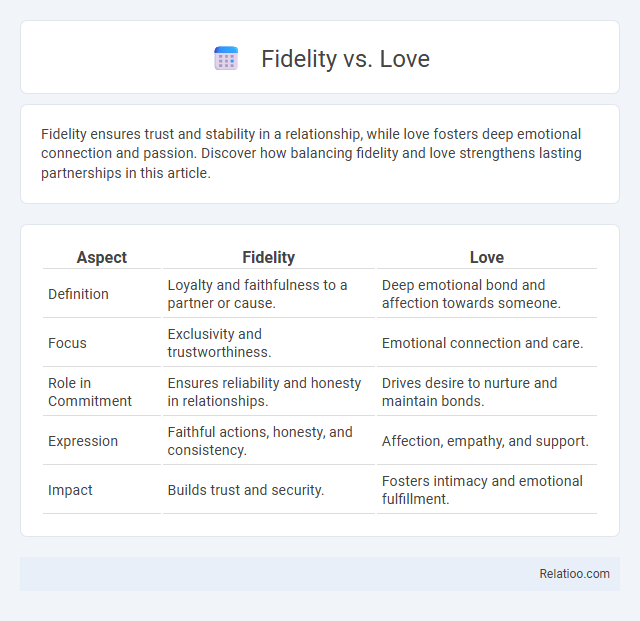Fidelity ensures trust and stability in a relationship, while love fosters deep emotional connection and passion. Discover how balancing fidelity and love strengthens lasting partnerships in this article.
Table of Comparison
| Aspect | Fidelity | Love |
|---|---|---|
| Definition | Loyalty and faithfulness to a partner or cause. | Deep emotional bond and affection towards someone. |
| Focus | Exclusivity and trustworthiness. | Emotional connection and care. |
| Role in Commitment | Ensures reliability and honesty in relationships. | Drives desire to nurture and maintain bonds. |
| Expression | Faithful actions, honesty, and consistency. | Affection, empathy, and support. |
| Impact | Builds trust and security. | Fosters intimacy and emotional fulfillment. |
Understanding Fidelity: Definition and Importance
Fidelity refers to the quality of being loyal and faithful to a person, cause, or belief, often emphasizing trust and commitment within relationships. It is a cornerstone for building emotional security, mutual respect, and long-term connection, distinguishing it from the broader emotional experience of love. Understanding fidelity's importance reveals its role in sustaining healthy bonds and preventing breaches of trust that can undermine relationship stability.
The Concept of Love: What Does It Really Mean?
Love embodies deep emotional connection, trust, and commitment that transcend mere physical presence or fidelity alone. Fidelity, while crucial, represents the act of faithfulness and loyalty, which supports the foundation of authentic love rather than defining it entirely. Your understanding of love should integrate emotional intimacy and mutual respect beyond simple adherence to fidelity.
Fidelity and Love: Are They Interconnected?
Fidelity and love are deeply interconnected concepts, with fidelity often viewed as a cornerstone of genuine love, providing trust, loyalty, and emotional security in relationships. While love encompasses a broad spectrum of emotions and commitments, fidelity specifically refers to faithfulness and adherence to agreed-upon relationship boundaries. Research in relationship psychology highlights that without fidelity, the stability and depth of mutual love can be significantly compromised, underscoring their symbiotic relationship.
Emotional vs Physical Fidelity: Key Differences
Emotional fidelity centers on maintaining a deep, exclusive emotional connection with Your partner, fostering trust and intimacy through shared feelings and honest communication. Physical fidelity, however, involves abstaining from sexual relationships outside the partnership, safeguarding the physical boundaries of commitment. Understanding these key differences helps strengthen Your relationship by addressing both emotional needs and physical trust.
Can True Love Exist Without Fidelity?
True love is often intertwined with fidelity, as trust and commitment form the foundation of enduring relationships. Without fidelity, emotional security may be compromised, leading to feelings of betrayal and instability. While love can exist independently of exclusivity, genuine true love generally requires fidelity to sustain mutual respect and deepen emotional bonds.
The Role of Trust in Fidelity and Love
Trust forms the cornerstone of both fidelity and love, reinforcing emotional security and mutual respect within relationships. Fidelity, rooted in consistent honesty and loyalty, strengthens trust, enabling deeper emotional connections and long-term commitment. Love thrives when trust ensures authenticity and openness, making fidelity an essential pillar that sustains intimate bonds and relationship stability.
Challenges to Maintaining Fidelity in Relationships
Maintaining fidelity in relationships often faces challenges such as emotional distance, temptation from external sources, and communication breakdowns. Your commitment can be tested by stressors like work pressure, unresolved conflicts, or lack of intimacy, which may lead to feelings of neglect or dissatisfaction. Building trust and consistently addressing these issues is crucial to preserving love and long-term fidelity.
The Impact of Infidelity on Love
Infidelity significantly undermines the foundation of love by eroding trust and emotional security between partners. Studies reveal that breaches in fidelity often lead to increased relationship dissatisfaction, emotional distress, and a higher likelihood of separation or divorce. Restoration of love after infidelity demands substantial communication, therapy, and mutual commitment to rebuild trust.
Building a Relationship Based on Love and Fidelity
Building a relationship based on love and fidelity requires mutual trust, emotional intimacy, and consistent commitment from both partners. Fidelity fosters a secure environment where love can deepen, allowing couples to navigate challenges with loyalty and respect. Prioritizing open communication and shared values strengthens the bond, creating a lasting foundation rooted in genuine affection and unwavering faithfulness.
Choosing Between Fidelity and Love: A Modern Dilemma
Choosing between fidelity and love poses a complex challenge in modern relationships, where emotional fulfillment often clashes with commitment and trust. You must weigh the value of loyalty against the deep connection of love, understanding that both significantly impact relationship stability and personal happiness. Navigating this dilemma involves honest self-reflection and clear communication to align your priorities with long-term relationship goals.

Infographic: Fidelity vs Love
 relatioo.com
relatioo.com